- Home
- Dennis Cooper
The Marbled Swarm
The Marbled Swarm Read online
The Marbled Swarm
A Novel
Dennis Cooper
Dedication
for Jesse Hudson
Contents
Cover
Title Page
Dedication
Chapter 1
Chapter 2
Chapter 3
Chapter 4
Chapter 5
Chapter 6
Chapter 7
Acknowledgments
Also by Dennis Cooper
Back Ad
About the Author
Credits
Copyright
About the Publisher
Chapter 1
Chateau Étage, as a corroded iron plaque leads the unsuspecting to believe, lies a multi-hour car ride from my loft in the Marais and near a small town whose hyphenated name I keep forgetting.
The wooded property is vast enough to hold a hill of slight historical value and the makings of a river where the older son of the chateau’s prior owner appears to have slipped, bashed his inebriated head against a rock, and drowned.
It was seeing this boy’s picture and obituary in Le Monde that led me to case the home originally, and, according to a subtext, an alleged sighting of his ghost that caused his superstitious parents to put it on the market.
I asked a real estate agent who’d wielded acreage for my quote-unquote father to arrange a walk-through, more out of a morbid-seeming curiosity than any real interest in acquiring the location at that point.
I don’t foresee a need to be explicit about the ping this death left in my irreparable imagination, as the consequences will speak out of turn and continually for themselves.
I’m at a loss to say why certain deaths strike me as secretive while others not so much. Granted, his full-fledged Emo look—which, if you were inattentive at the time, turned depressive youths into prêt-à-porter’s backseat drivers for a season—left his hole in the world more romantic than most. Still, I suppose it could be argued that every new hole leads to anywhere else.
I will say for what it’s worth that had he been singled out as a, oh, doer of good deeds, I might have sighed at his meaningless plot and turned the page.
Like every chateau I’ve had occasion to visit, mine appears to have been built exclusively to turn the heads and mist the eyes of peons driving to and fro along the corresponding road. Given the building’s excessive age, no doubt its obscure architect had horse riders and peasants trudging on foot as his intended targets, but the bombastic effect has proven timeless.
I remember quite well how my tinier mind mistook the chateaux dotting France’s far-flung hilltops for concise Disney castles when, in tragic fact, they’re just giant farmhouses with a Napoleon complex. True to form, driving down my chateau’s muddy driveway can cause one’s car to seem a frilly carriage, but merely cracking the front door leaves you moping behind its magician’s back.
Since my visit occurred on a weekend, the dead boy’s father, Jean-Paul, mother, Claire, and younger brother, Serge, happened to be facets of the tour.
Jean-Paul found me suspicious until a bank statement closed the gap between my inheritance and the childish-looking features I control. I’ve learned to carry said documents almost everywhere I go, since I’m told my vibe suggests a cosmopolitan sixteen rather than the twenty-two-year-old
worrywart I am.
Once the credentials were perused and returned, my politely nuanced interest in their loss combined with their addiction to all things him-related toppled a small bookcase’s worth of gossip that would be tedium incarnate at this stage.
The family encouraged me to stroll, albeit supervised, about his former bedroom, a neat freak’s cubicle containing nothing more of note than an antique desk whose drawers I lacked a good excuse to open and a short shelf full of DVDs and novels so anonymously trendy they’re too out of print to even bother listing.
Jean-Paul singled out the wall where his son’s paranormal image had been spotted distinctly if blurrily in the paint, and although I squinted, it remained a dead blank for the duration of my initial peek and show of concentration.
Before I imbed you in my story too repletely, let me single out Claire, the wife and mother, who might have suited my proclivity to look straight through almost any women I encounter had she not seemed more realistically a sister to young Serge, whose height she barely eclipsed.
This mismatch caused me to experience a most unsightly daydream in which a beet-red, hyperventilating infant gave birth to another crimson, screaming infant.
The aforementioned Serge, a childish-looking fourteen-year-old and hard-core Emo like his sibling, tastelessly offered to show me where the unfortunate’s body had been found. I agreed before his parents could reprimand him, both for reasons that must be obvious by now and because, if I may be blunt, the boy was literally his brother’s twin after a judicious edit.
Walking to the crime scene, I feigned admiration for how subtly his family or their gardeners had compromised their parcel of France’s magnitude. They’d teased out a pleasant nature trail while wisely sparing their grounds the aesthetic lock and key that might have buried it in Frisbees and croquet sets.
While I bored my fellow hiker into an advantageous daydream, my eyes were busy with his more painstaking head of hair and outfit. With each footnote I ascribed to them, the more eerily he epitomized one of my “types,” as those who shrink-wrap their opinions in set phrases like to put it. I have four, although, for the sake of brevity, I prefer to call them hot spots, each with its own set of qualifiers and subcategories, and they will queue up here later.
However, lest the term “type” mislead you, let me add that were I gay and not the creep to whom you’ll turn the other cheek soon enough, I might have preferred, in Serge’s case, someone tall enough that I could jab my tongue into his mouth without appearing unsightly.
Serge favored vintage black Slimane jeans, so tight in the legs that his near-robotic gait would have made Pinocchio a track star. His faux old-fashioned choice of a white and gauzy sweater flecked with Christmas trees was geared to mismate with a visible black T-shirt whose skull-emblazoned front seemed to represent his tortured soul’s Peeping Tom. His limp, unimaginatively brown, forgotten-esque hair was worn in two chin-length, barely parted bangs that cordoned off a lightly made-up face so classic that, had he not been such a downer, it might have sucked fan mail into his in-box like atmosphere into a punctured jet.
So taken was I with the drab atmospherics and festive details of this crosshatched-seeming boy that I was caught quite off guard when his morose eyes rose just far enough to spot the bulge he had occasioned in my slacks.
I might have paused long enough to explain this billow was more undercover cop than confidant had his prying eyes not also signaled our arrival at the crime scene.
It was indeed a river wide and reliable enough to have inspired a crooked blue line on local maps, but not so pretty on the eyes or that much livelier than a cross-country puddle to have warranted a name.
To hear Serge, Claude had wandered off one night, drinking all the way, wound up here, and somehow suffered his unfortunate accident. He’d lain dead and undiscovered in the water so lengthily that when a groundskeeper found a bloated corpse, he mistook it for a heavyset trespasser in his fifties.
Even Jean-Paul and Claire hadn’t recognized Claude in the gardener’s wheelbarrow. They’d ordered the remains incinerated on a pyre, as had long been the custom in the region when discovering the hulk of an itinerant. But then Claude was discovered missing and not gallivanting elsewhere, and the unexplained and obvious were belatedly united with a plus sign.
Sharing this unpleasant detail seemed to weaken Serge, and he sat down heavily on the river’s slopin
g grassy bank. When I asked him which slippery rock had done the damage, he grew even more forlorn and pointed vaguely at the boulder I had guessed.
As I peppered Serge with maudlin fanboy queries, his body slumped and trembled slightly under memory’s weight. At the same time, his downcast eyes seemed increasingly taken with something about me, if that mixture of recalcitrance and focus is even possible.
The face I showed him in return could have led to every awful secret I possess, one of them involving him, but, using the hearsay that Emo equaled gay, or quite curious, at least, I wagered he was far more built to ferret sleaze from boys than their intentions.
On the off chance my manner hasn’t made self-flattery a metaphoric gild to my veritable lily, allow me to infer that on the issue of attractiveness, I could spend many numbing if prettily over-written pages counting the ways in which my beauty is a fact, disputed by no one I’ve ever met, although I suspect a simple background check might do.
My father, or rather the man I will generally refer to as my father, cannot in truth take any credit for my layout. My mother, who was loosely an actress until my fetus trashed her waistline, appeared in a handful of films that the passage of time has revised from daring cinematic gestures to unwatchable displays of self-indulgence, usually playing a prostitute.
The last film in her middling CV was directed by the cultishly forgotten auteur and, more important as per my point, psychedelic heartthrob actor Pierre Clémenti, with whom, yes, my mother slept while on some drug binge, ultimately producing a child whose gradual enlargement would reveal to my father’s glazing eyes a face that has struck more than one film buff of my acquaintance as scanned at high resolution from Clémenti’s. Luckily, I have escaped his chalk complexion and, pray to God, his career-derailing hair loss.
Given the freedoms of that face, it’s not difficult to flirt, or rather fake the act of flirting, when it’s absolutely necessary, and so I did.
While Serge’s signals weren’t as gifted, or perhaps I mean well versed, unless winking and snorting has an erotic outreach to which I am immune, his new erection, plain as day and on the scrawny side, gave me the confidence to leer in his direction with ever greater effervescence.
“So, are you really going to buy this place,” he asked.
I’m just rich enough to answer yes, I was, and even mean it. To be honest, I’d already concluded that the chateau’s backyard, if one can tag a walled-off forest with that consolidating term, was a kind of Père Lachaise Jr. just waiting for any number of shovels to render its existence.
If that were true, Serge wondered aloud, could he store his drum set at the chateau, then practice after school and possibly on certain weekends? Their new home, he explained, was just a chip of tower block whose vaporous walls and floors would dash a career he’d embarked on at eleven.
While God is an idiotic premise, I often half wonder why it is that life, or mine at least, seems less to change from day to day than to be solved like an equation. For, not moments before, I had all but decided Serge would need to die before he suited me, and I had turned my attention to devising the first opportunity to see him crumpled on the ground.
Thus, I agreed to his request without so much as a torturing, in-between pause, and even added an uncalled for phrase regarding how nice it would be to spend more time with him.
While his head bobbed enthusiastically, and his somber eyes milked mine, I wiped the content from my face and suggested we return to the chateau, where I would state my serious intentions to his parents.
Retracing our steps down the trail that formed the property’s chief thoroughfare, I began the lengthy process of discrediting Serge, as I call it, which you will come to understand is my modus operandi in these cases—namely, by plying him with questions about his likes and dislikes. Sure enough, and let me add that this assessment stood beyond his death, there was literally nothing worth archiving in the boy’s head whatsoever.
It’s true that until a year or two prior to that afternoon, I might have set myself the less ambitious goal of having some variety of sex with him, then, severely disappointed, as I’ve always been by sex, and worrying about the act’s illegality, murdered him after a day or two or week of careful planning.
Had Serge been a sculpture, he would not have been a sculpture in the first place but a simple pedestal, although connoisseurs less rigid than myself might have argued that it held a cute if over-decorated bust.
By then we were approaching the chateau. I spied its owners chatting, cocktails in hand, as they awaited our return among the paths of a small, well-kempt garden. When the boy and I were visible amid the backyard’s copse of centuries-old maple trees and flowery hedges, Jean-Paul and Claire waved, whereupon my young companion, flashing v for victory with both raised arms, trotted ahead to join them.
“Might I have a final look around,” I yelled to those assembled, having waited to inquire until after the boy broke his good news, which I knew would leave the owners with no decision in the matter unless they wanted to be rude.
I left the trio toasting their new income and/or added storage space and made a roughly forty-minute study of the chateau I’d just hastily acquired.
In most respects, it was nothing but your average chateau, full of heirlooms only heirs would even bother to insure and elderly chairs and tables that only tourists could refer to as antiques. Where the walls weren’t painted the rustic white of farm eggs, they were quashed by oldfangled wallpaper that did nothing but repeat a bleached-out scene of birds in flight at sunset.
The kitchen, with its chilly marble floor, tub-sized sinks, and the counter space to busy several chefs, did impress me since, as you’ll come to understand, cooking from scratch, and by scratch I mean from autopsy to dishwasher, is far more than a spectator sport for me.
Still, what clinched the wisdom of my purchase was the basement, which I would later learn had been a penitentiary before the building formed its cap. It was still a simple, run-down jail, although its six small cells, each fitted with the classic metal bars and inclusive of an integrated swinging gate, held stacks of sagging cardboard boxes instead of gaunt prisoners.
Additionally, there was a metal door that locked a room that I would glean from doing research at the local city hall was once intended as a medical facility for the incarcerated, but had mostly been the site of unspeakable, as they always say, tortures and executions.
I’d just leant myself a decent budget to restore the basement’s sullen antecedent when I spotted Serge’s florid silhouette among the room’s hazier shadows.
“Why,” his voice asked, “did you say it would be nice to spend more time with me?”
Wait, have I mentioned that, prior to that afternoon, I’d committed several murders, or, rather, helped facilitate several boys’ demises for reasons I’m withholding for the moment? If not, let me illustrate myself to that degree before I say another word, as it will shortcut this story to the expertise I’ll now attribute to my curious behavior, and which I would otherwise need to bore myself as well as you with in the course of explaining.
As Serge fiddled with his bangs and grazed my calculating face, I rifled through my conquests, if that term is not too vibrant to apply to what amounted to fatalities, and settled on the tactics I’d used with reasonable success in an early and not so different case, although that boy was only twelve years old, and more important, my brother.
“Serge,” I said, and cast an anxious look around, seeking to befriend his worries with my own, “what I meant to say back by the river was . . . You should think of the chateau as your home away from home, your getaway, your . . . tree house, if it pleases you. I could make up some official-sounding job to help legitimize this . . . well, peculiar-sounding, I’ll admit, arrangement to your parents, when the truth is . . .”
I’d planned a lengthy, complicated answer interspersed with many thoughtful dot dot dots, but it seemed the boy had heard his password.
First positioning himself be
neath one of the glary, dangling lightbulbs that crosscut the basement’s abrasive-looking ceiling, Serge started rolling up his Christmas sweater’s sleeves.
“Look,” he said disconsolately, and, before I could, he gave those arms the job of similarly yanking up his skintight jeans legs, a task I could have told him was in vain, and which resulted only in the minor revelation that he wasn’t wearing socks.
Still, in the time it had taken him to tug and fail, I’d scanned his arms sufficiently to get the gist of what I gathered was a “take it or leave it” type of offer.
Namely, Serge was, in the shorthand of that era’s therapists, a cutter. When he was sad, which, judging from my initial scar count, appeared to have been often, he would hold a razor to his pasty limbs and slice into the flesh. Mostly, he’d left rows of unimaginative zigzags up and down his forearms. Occasionally, however, he’d gone bonkers and carved a word—I spotted “shit” and “kill”—or an occult-looking symbol, all for the purpose of . . . well, God knows.
In truth, I also know the whys as of this writing, but to tell you now would be to tinker unhelpfully with my story’s glacial timeline.
Serge fished a razor blade from some compartment in his outfit and sent it fluttering in my direction, yelling words to the effect that I should find a way to use the blade to slash away his sweater, T-shirt, chest, and rib cage, and then reach inside and excavate his heart.
So, there he stood, or rather cowered, certain he’d repulsed me with his idiotic honesty about the blight awaiting anyone saintly enough to have given him the slight impression that it would be interesting to fuck him.
Here’s where I’ll focus myself, or, rather, you can focus me, if you care, which you should, even those of you who see yourselves as reading from the cheap seats.

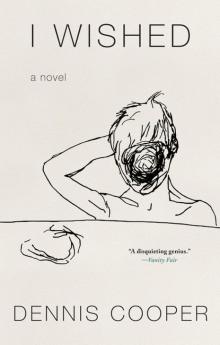 I Wished
I Wished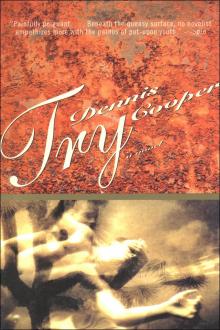 Try
Try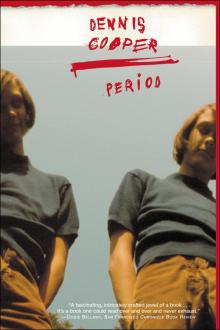 Period
Period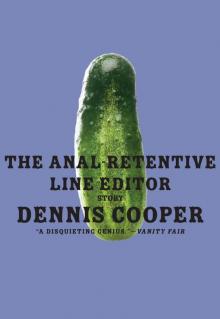 The Anal-Retentive Line Editor
The Anal-Retentive Line Editor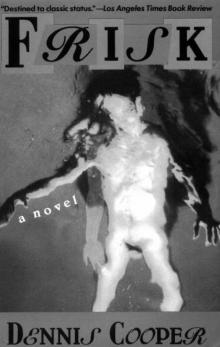 Frisk: A Novel (Cooper, Dennis)
Frisk: A Novel (Cooper, Dennis)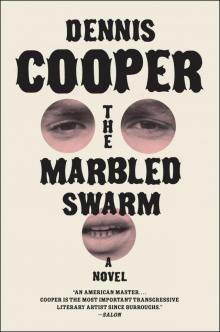 The Marbled Swarm
The Marbled Swarm